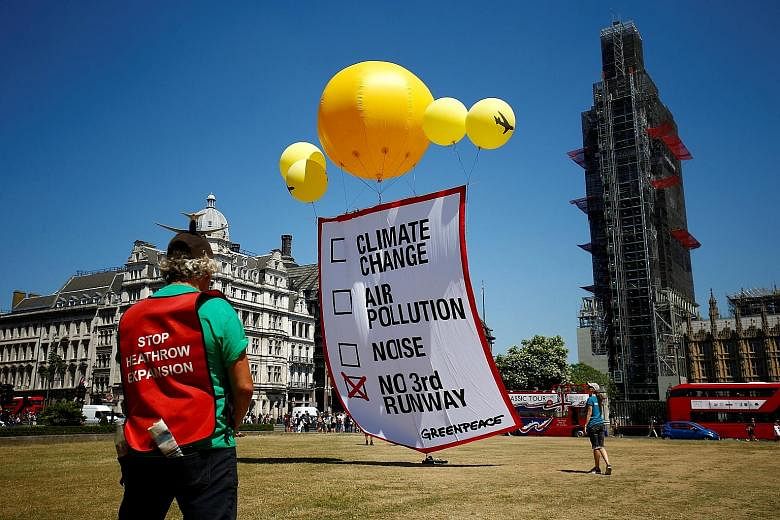The British Parliament has voted to give London's Heathrow airport, Europe's largest, a controversial third runway despite a last-ditch protest by activists worried about the project's environmental impact.
But although the runway proposal was passed by 415 MPs voting in favour with only 119 voting against and was immediately hailed by Heathrow's chief executive John Holland-Kaye as "the right choice for Britain", the reality remains that approving the project has taken an astonishing 50 years, cost the careers of many politicians and is still far from over.
Ironically, when Heathrow's construction was mooted during World War II, planners conceived of an airport of three runways from the start. But due to lack of anticipated demand, the plans were scaled down and Heathrow remained condemned to two runways.
London's main airport handled 78 million passengers last year, with flights to Singapore being not only among its top 10 busiest international routes, but also the one registering the fastest growth - up 12.6 per cent last year.
The airport is bursting at the seams. Heathrow's two runways operate at 99 per cent capacity with one take-off or landing every 45 seconds and the slightest delay causing mayhem.
The option of expanding other, secondary London airports has often been touted but none offers the same connectivity or ease of access. A third runway would allow Heathrow to handle 740,000 flights a year, a third more than currently and close to the capacity of Paris, Frankfurt and Amsterdam, London's closest European competitors.
One would have thought that Britons would be supportive of retaining a hub which offers the largest number of connections in the world and employs a quarter of a million people. But despite the fact that Heathrow's runway expansion has been discussed since the early 1970s and no less than six separate government committees of inquiry identified this outcome as the preferred one, nothing happened.
The key political difficulty is that Heathrow sits in the middle of a vast London urban sprawl, home to around 60 parliamentary constituencies, about a tenth of the total in the UK. All resent the extra noise and pollution, and most tend to vote Conservative Prime Minister Theresa May's party. Never mind the fact that many of these residents are among Britain's most affluent and frequent users of air travel; the story of Heathrow is a classic example of the "not in my backyard" syndrome.
Less than a year after the latest general election and with a theoretical four more years to govern, Mrs May has calculated - probably correctly - that now is the best time to get the matter concluded. But this still came at a political cost. Mr Greg Hands, the MP for Chelsea, London's swankiest central area where residents think nothing of jetting off for the weekend to top up their tans, resigned from his job as trade minister because he promised his electorate to oppose the project.
Foreign Secretary Boris Johnson, whose leafy suburban constituency is also on Heathrow's flight path and who once threatened to "lie down in front of the bulldozers" if a third runway got the go-ahead, miraculously managed to schedule a trip to Afghanistan just as Parliament debated the matter to avoid both the bulldozers or the option of resignation.
His wheeze was too clever by half; shouts of "where is Boris" dominated the parliamentary vote in the early hours of yesterday morning, and will do nothing for his political standing.
And, gallingly for Mrs May, this may not be the end of the Heathrow saga. Greenpeace UK has made clear its intention to take the government to court over environmental issues connected to the airport. Nobody also knows where the estimated £14.3 billion (S$ 25.8 billion) required for the project will come from, although the government promises that British taxpayers will not foot the bill.

